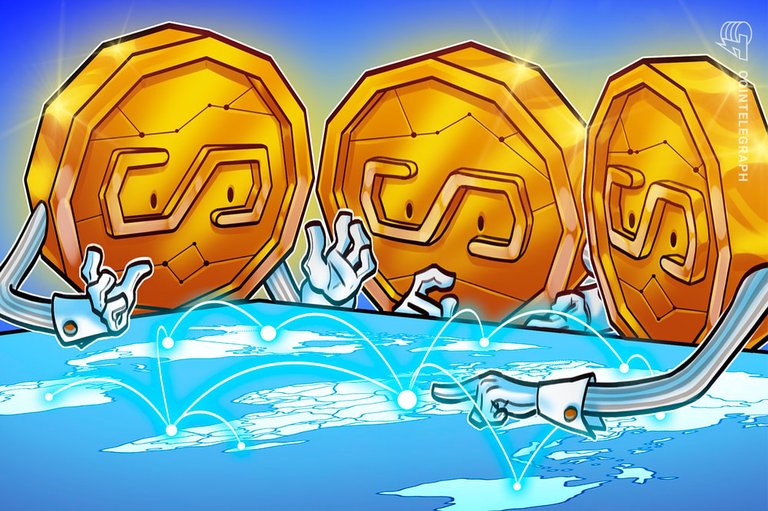If the rest of the world were smart, they'd all invest in decentralized USD-pegged stablecoins
Decentralized USD-pegged stablecoins are positioned to aid emerging economies grow with minimal debt, as substantial debt is generally crippling and the cause of native currency devaluation.
A lot of people do not understand how liquidity works, it's truly a painful reality and that is essentially why many are often caught believing the United States loses money doing literally anything for the world.
Sure, the United States has a fat debt, but the rest of the world is heavily exposed that it is essentially a problem for a lot of people.
How could this be true?
Let's talk about:
Liquidity: how the USD rules and traps Global markets
You know how people say that stablecoins will make the USD wildly accessible?
I say this too, in so many forms but forgive me because this isn't entirely true. What stablecoins do generally is cut the middlemen away and allow people who already have access to USD to use it at a global scale more efficiently.
Everyone else? It's a story as usual. But this is a story a lot of people don't know. Just because $10 trillion USD supply gets dumped on-chain through stablecoins doesn't mean that the world can access it and no, this isn't because of technological or regulatory restrictions, but the simple fact that it just doesn't work that way.
Markets work when there's liquidity, but this is something many don't really understand.
Imagine if I somehow acquired $100 million USD in any fiat-backed and centralized stablecoin, then I created a random token on-chain and paired it with my $100M stack and came out to say:
“Oh, we've deployed $100M USD for purchase and you can access it by buying X token, to which you can then trade for the USD”
Would you be comfortable making that trade? Especially understanding that the value of said token can crash at any time?
Ok, that one doesn't really sound bad because you can complete the trade immediately, yeah?
What if I printed more of said random token and went to any exchange, platform or bank with USD stablecoins and tried to buy said stablecoins with my random token, let's say $30M’s worth, do you think they'd facilitate that trade?
Now the question is: why would you not be comfortable making the trade? and likewise, why wouldn't the exchange facilitate the trade?
It's simple: there's no incentives for them or you to do so, only significant risks because my token isn't globally recognized or accepted and even though I've paired it to $100M USD, $30M, to which I tried to acquire with more of my tokens would expose the exchange, platform or bank to a very illiquid market because if they tried to dumb said token, they'd get less USD because $30M is already 30% of the available USD-side liquidity and an order of that size would crash the value of my token.
This is what the global market is like.
They are numerous currencies, most are not accepted at the global scale because they are illiquid(that is have access to little USD-side liquidity), so they cannot be directly used to buy products or pay for services and sure as hell cannot be used to directly acquire the USD, so how then do these countries access the USD?
There are a number of ways, but usually through exports. When countries export goods, they generally get paid in the USD. For countries that are oil rich, this is usually how they access USD because the USD is the dominant(default in a sense) currency for oil trades globally.
But, well, that can only get you so much. These countries have to hold reserves with their central banks and also sell a couple to the smaller banks. At the end of the day, there's generally not going to be enough.
Then comes the debt acquisitions in the international markets that can have varying terms, and remember, repayments have to be in USD, so generally, new debt just keeps getting acquired, you see where this is going?
Most of the world is wholly trapped!
Decentralized stablecoins: the solution?
You want to look at solutions that don't require direct hold of USD and that are essentially decentralized USD-pegged stablecoins.
Of course for this to really work, the governments of these countries have to go to great lengths to give its citizens freedom and empowerment to leverage crypto and blockchain tech.
This is because it needs citizens to hold foreign roles(or global businesses) that can gain payments in crypto assets that can be used as bridge currencies to hedge decentralized stablecoins markets. Lots of lines of incentives have to be placed to give these countries an edge to acquire significant USD-pegged decentralized stablecoins.
Think of it like this:
A significant population becomes active remote workers(or own globally functioning businesses). Get paid in BTC, ETH or even USDT or USDC.
The government sets up incentives markets for said workers and business owners to sell these crypto tokens for their native currencies.
This could be successful if they would get premium rates for their tokens.
When the government gets their hands on this, they can invest in decentralized USD-pegged stablecoins(can also obviously hold back on some of these tokens as a dual strategy to capitalize on capital appreciation).
Why? Because these stablecoins are generally meaningful economic exposure to the USD and they lack the single points of failures that would be high risk for any government.
At the end of the day, they can successfully build deep USD-liquidity that they can use to stabilize their FX, making their native currencies generally more liquid, at which point, can become attractive for trade settlements with other countries.
Will they do anything close to this? Highly unlikely but if they were smart, crypto presents a real opportunity.
Posted Using INLEO
